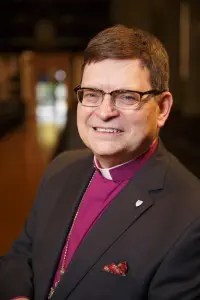
The Archbishop’s Pastoral Letter to Vestries, 2015, is to be read or circulated on the Sunday of the parish’s annual vestry meeting.
To the Clergy, Churchwardens and Parishioners
My Sisters and Brothers in Christ,
Grace and peace in the name of our Saviour Jesus Christ.
The Area Bishops and I are deeply grateful to all of you gathering today in the annual Vestry meeting of your parish to review the past year and establish priorities for the year ahead. We offer you our prayers and support as you continue to join in Christ’s mission to his world.
This past December marked the 175th anniversary of the installation of John Strachan as first Bishop of Toronto in the newly created Cathedral Church of St. James. The young colony over which he presided – all of southern and most of northern Ontario – was a very different community than now. Nonetheless it was facing rapid growth, new immigration and ethnic tensions (e.g, Irish vs English, and Roman Catholic vs Protestant). The new diocese had to come to terms with being Anglican in a challenging context, learning to adapt from the privileged position of a state-supported and protected established Church to being one part of a multidenominational mix.
Bishop Strachan identified four principles that continue in our DNA today:
- A Missional Approach: The diocese established new parishes and innovative ministries to proclaim the Gospel in response to the religious needs of a growing population; within 35 years, four new dioceses were carved out of Toronto to assist in that mission.
- Contextual Ministry: The creation of an indigenously recruited and locally trained ministry, both clerical and lay, would be necessary to understand and minister most effectively in the new world context. As a teacher, Bishop Strachan valued education of the highest order in all disciplines, including science, arts, technology and theology.
- Self-sufficiency: Bishop Strachan knew that the new diocese and its parishes could not thrive if they looked primarily to outside resources to fund the ministry. Instead, there was a need to develop strong financial support from the laity. This meant that the laity needed to be engaged in the decision making processes of the Church. This led to the development in Toronto of some of the first Synods in the Anglican Communion.
- Social Engagement: The Anglican ethos was integrally connected with the whole of society, with a concern for the welfare of the civil community as well as the Church – so Anglicans expected to be engaged in schools, government, business, hospitals and work with the poor as a public expression and natural extension of their faith.
We have inherited this DNA and it marks our witness to Jesus Christ through “intelligent faith, compassionate service and Godly worship.” I am pleased to say that we are increasingly reclaiming our fundamental role as a missional people – listening, discerning and joining in God’s great work of building the Kingdom and reconciling all things in Christ.
Across the diocese, in rural communities, suburbs and cities, Anglicans are reaching out in faith in creative ways as well as the tried-and-true approaches. Applicants for ordained ministry continue to come forward – more than a dozen will be ordained this year from diverse backgrounds and ages. Over 10,000 individuals have completed screening in order to participate in significant lay ministries across the diocese. The contributions to the Our Faith, Our Hope campaign, to parish budgets and the FaithWorks ministries are sustaining our work. And as Christian citizens we are deeply engaged in the welfare of communities where we live.
I hope that the priorities for ministry, the programmes you offer, and the work you do in your parish meeting today support this mission.
As part of our engagement with our community, I draw your attention to the proposal for a motion on climate change prepared by our Social Justice and Advocacy Committee. It is deliberately framed to allow it to be tailored to your own context. While it is helpful to have the motion passed or amended – I can use this data when I meet with members of government, for instance, to indicate the level of support that I represent – that is not the most important thing. For me, it is to have the issues discussed and people of all persuasions to commit to learn more, understand better and act responsibly and faithfully in the name of Jesus Christ.
There are inevitably different possible solutions and different ways of both understanding and addressing the problems, which is why open discussion and healthy debate within our parishes on these matters is an essential part of our Christian duty. Complex issues are not solved only by experts. In fact, solutions to complex problems require imagination, creativity, determination and changed attitudes because expertise does not yet exist. As Anglicans, we know that we need to wrestle with how we interpret our faith and that there will often be competing conclusions. There is, however, no such thing for an incarnate Christianity as faith without engagement with the issues of the day.
I want to thank especially the churchwardens and the lay leaders of your parish, as well as the clergy, for their incredible gift of their time and energy this past year for the ongoing life of the Church. We could not function without them. We welcome those who are beginning or continuing in office this year and assure them of our prayers and support.
Together with the College of Bishops, I wish each of you every blessing for the year of our Lord that lies before us.
Yours faithfully,
The Most Rev’d Colin R. Johnson
Archbishop of Toronto
A PDF of the Archbishop’s Pastoral Letter to Vestries is available here.